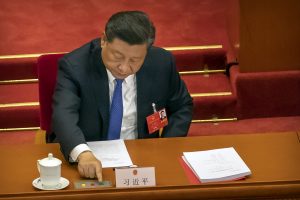Recently, in response to a proposed national security law pertaining to Hong Kong, U.S. President Donald J. Trump announced that he would end the administrative region’s special trading status as a way to punish China.
Advocates for the move argue that since the original U.S. law was premised on Hong Kong retaining sufficient autonomy from Beijing, revoking Hong Kong’s special status is automatically justified.
Yet while the president has the statutory authority to treat Hong Kong as under Beijing’s control, doing so in effect punishes the city for being victimized and is likely to be counterproductive, resulting in heavy economic losses for Hong Kong and U.S. firms without changing Chinese behavior. Being on the morally right side in spirit doesn’t make the proposed U.S. policy sensible.
Trump’s action came a day after China’s rubber-stamp legislature passed a motion to begin drafting a new security law for Hong Kong. The law, a response to protests that have roiled Hong Kong for nearly a year, would ban whatever it defines as sedition, subversion of state power, foreign interference, and terrorism. China’s action arguably violates the “Sino-British Joint Declaration on the Question of Hong Kong,” which guaranteed 50 years of limited autonomy for the territory under Beijing’s rule. The law could lead to a mainland-orchestrated crackdown on Hong Kong’s dissenting protestors and political activists when it takes effect, likely by September.
U.S. law currently treats Hong Kong as an economically-independent entity subject to no tariffs and given special visa treatment. While Trump announced he will end these privileges, the administration has yet to officially implement this policy. So some possibility remains that it could change course and issue only symbolic changes while preserving Hong Kong’s major economic benefits.
One reason changing Hong Kong’s status is a mistake: the biggest loser from a revocation would be the victims of the action it intends to punish — citizens of Hong Kong. The city is a hub for east-west trade and has close relations with Western firms doing business in mainland China, both because of its strong rule of law and its special trading status under U.S. law. These conditions help generate an estimated $67 billion in annual trade of goods and services with the United States.
Another reason not to change Hong Kong’s status is that it won’t work. The odds of producing a good policy outcome via this action are remote. Systematic studies reveal practically no evidence that countries will change their core national security interests due to economic pressure, especially major powers. A long, failed history of pressuring Cuba, North Korea, Pakistan, Iran, and dozens of other countries shows U.S. economic coercion tends to fail because it imposes economic harms on the people of a country more than its leaders — turning anti-regime sentiment into anti-U.S. resentment. Targeted governments usually see the harms directly inflicted on themselves as less important than the benefits derived from the sanctioned action.
This is a clear case where economic coercion is unlikely to work, and this would be so even if the costs were extremely large and more directed at the Chinese government. Unlike the small states U.S. sanctions usually target, China is a great power and can easily sustain some lost trade. And, like it or not, the question of independence for Hong Kong, or a mass movement that can lead to such, is an existential issue for China, one on which it is unlikely to budge due to American pressure. Imagine an outside power using economic pressure to force the United States to grant Puerto Rico independence.
Moreover, changing Hong Kong’s status will not only undercut its exports and harm the economy, but also invite Chinese retaliation. Beijing may change the rules benefiting U.S. firms in the region, some of which might move their offices to the mainland as a result. This cycle of economic pressure and retaliation can undermine the long-term prosperity of Hong Kong, and opportunities for U.S. firms and Americans to prosper, while making the territory more dependent on Beijing.
What is the alternative? Multilateral campaigns of moral suasion, as proposed by many in Europe, are not hopeless. Few states are entirely immune to the judgement of the international community. That effort could be combined with steps that follow the British example of liberalizing immigration rules for Hong Kong’s residents, including accepting as refugees any who are persecuted by China for peaceful political activity. This would register disapproval while at least doing something useful for the people of Hong Kong.
Symbolic measures, with real world harms and no benefits, make for irresponsible foreign policy. Europe, which has shown little interest in following Washington down the path toward confrontation, seems to have a more sensible approach. EU Minister of Foreign Affairs Josep Borrell recently said he did not believe that “sanctions against China are going to be a solution for our problems.”
The sad truth is that there is little the United States can realistically do to prevent Beijing from exerting its control over Hong Kong. Measures meant to stand up for freedom against an autocratic bully become far less noble when their failure is predictable. The United States can do some good for the people of Hong Kong by at least not rushing to make matters worse for them.
Richard Hanania is a Postdoctoral Research Fellow at the Saltzman Institute of War and Peace Studies at Columbia University and Fellow at Defense Priorities, where Benjamin H. Friedman is Policy Director.

































